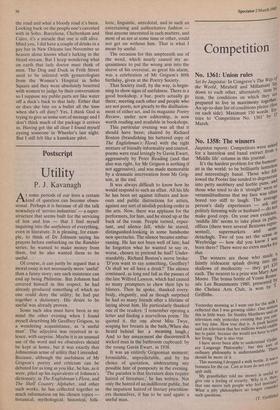Postscript
Utility
P. J. Kavanagh At some periods of our lives a certain kind of question can become obses- sional. Perhaps it is because of all the talk nowadays of 'service industries' — a super- structure that seems built for the servicing of less and less — that I find myself inquiring into the usefulness of everything, even in literature. It is pleasing, for exam- ple, to think of Dr Johnson saying his prayers before embarking on the Rambler series; he wanted to make money from them, but he also wanted them to be useful.
Of course, it can justly be argued that a moral essay is not necessarily more 'useful' than a funny story; any such insistence can end up being Philistine. But Johnson had covered himself in this respect, he had already produced something of which no one could deny the utility; he had put together a dictionary. His desire to be useful was already proven.
Some such idea must have been in my mind the other evening when I found myself describing Mr Geoffrey Grigson, to a wondering acquaintance, as 'a useful man'. The adjective was received in si- lence, with surprise. Maybe it is an unusual use of the word and we obsessives should be kept at home, but it was exactly that Johnsonian sense of utility that I intended. Because, although the usefulness of Mr Grigson's poetry and criticism can be debated for as long as you like, he has, as it were, piled up his equivalents of Johnson's dictionary; in The Englishman's Flora, and The Shell Country Alphabet, and other such works, he has collected together so much information on his chosen topics — botanical, mythological, historical, folk-
loric, linguistic, anecdotal, and in such an entertaining and authoritative fashion — that anyone interested in such matters, and most of us are at some time or other, could not get on without him. That is what I mean by useful.
The occasion for this umpteenth use of the word, which nearly caused my ac- quaintance to put the wrong arm into the sleeve of his overcoat, so great his alarm, was a celebration of Mr Grigson's 80th birthday, given at the Poetry Society.
That Society itself, by the way, is begin- ning to show signs of usefulness. There is a good bookshop, a bar, poets actually go there, meeting each other and people who are not poets, not greatly to the disillusion- ment of either set, and its magazine Poetry Review, under new editorship, is now worth reading and available in bookshops.
This particular evening was all that it should have been; chaired by Richard Boston (brandishing his battered copy of The Englishman's Flora) with the right mixture of friendly informality and control, poems were read lovingly by Gavin Ewart, aggressively by Peter Reading (and that also was right, for Mr Grigson is nothing if not aggressive), and was made memorable by a dramatic intervention from Mr Grig- son, at the end.
It was always difficult to know how he would respond to such an affair. All his life he has been set against tributes and hon- ours and public distinctions for artists, against any sort of modish pecking-order in the arts. Now, there was applause for the performers, for him, and he stood up at the back of the room. People turned, expec- tant, and silence fell, while he stared, distinguished-looking in some handsome new spectacles. The silence became embar- rassing. He has not been well of late; had he forgotten what he wanted to say or, worse, chosen to pretend he had? Under- standably, Richard Boston's nerve broke: 'D'you want to say something, Geoffrey? Or shall we all have a drink?' The silence continued, as long and full as the pauses of the late Wilfred Lawson, which had caused so many prompters to chew their lips to blisters. Then he spoke, thanked every- body, elegantly, and as though surprised he had so many friends after a lifetime of laying about him. He particularly thanked one of the readers: 'I remember opening a letter and finding a marvellous poem.' He quoted it, the one about Miss Twye, soaping her breasts in the bath,/When she heard behind her a meaning laugh,/ And to her amazement she discovered/A wicked man in the bathroom cupboard: by the young Gavin Ewart, in 1938.
It was an entirely Grigsonian moment; formidable, unpredictable, and by his choice of quotation, undercutting any possible hint of pomposity in the evening. 'The paradox is that literature does require hatred of literature,' he has written. Not only the hatred of an indifferent public, but the impatient hatred of literary practition- ers themselves, it has to be said again: a useful man.














































 Previous page
Previous page